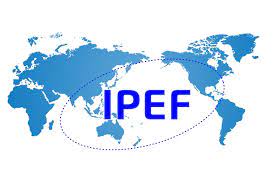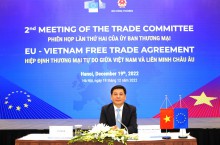The News
Trade minister: Indonesia joined IPEF for access to U.S., Indian markets
Greater access to U.S. and Indian markets was a key reason Indonesia elected to join the Indo-Pacific Economic Framework for Prosperity negotiations, Indonesia’s economy minister said this week, calling on partner countries to work toward finalizing IPEF outcomes within a year.
Greater access to U.S. and Indian markets was a key reason Indonesia elected to join the Indo-Pacific Economic Framework for Prosperity negotiations, Indonesia’s economy minister said this week, calling on partner countries to work toward finalizing IPEF outcomes within a year.
Minister for Economic Affairs Airlangga Hartarto spoke during a Monday discussion hosted by the Center for Strategic and International Studies, addressing Jakarta’s economic priorities and areas in which the U.S. and Indonesia can cooperate.
In response to a question from the audience, Airlangga said a key factor behind Indonesia’s decision to join IPEF talks was access to new markets – something the U.S., which leads IPEF, has said will be possible through the framework’s trade pillar, though negotiations will not be focused on traditional market-access openings.

Nonetheless, Airlangga said, “I think most of the things that [are] attractive for Indonesia, apart from the empowerment, also [is] the market access.”
Indonesia has newfound access to key markets, including China, Japan and Australia, via the Regional Comprehensive Economic Partnership, he said, and through IPEF it hopes to enjoy greater access to “America and India, so it’s a kind of complementary to Indonesian economics.”
All of IPEF’s 14 member countries last month agreed to join talks on three of the framework’s four pillars; India joined three but opted out of the trade pillar negotiations over concerns about possible environmental and labor commitments.
RCEP is a free trade agreement between all 10 ASEAN member states and Australia, China, South Korea, Japan and New Zealand. As a member of ASEAN, Indonesia in August confirmed its RCEP membership. ASEAN’s secretary-general last month said he was “hopeful” that all of the bloc’s members would eventually join IPEF.
Airlangga said Indonesia wants the framework to lead to meaningful “deliverables of projects” that have “an impact on the Indonesian people” and said the country hopes for an agreement on key issues “within one year.”
Airlangga also said he was “quite optimistic” that IPEF trade talks would extend beyond trade facilitation. Trade facilitation is one of the trade pillar’s areas of focus.
USTR Katherine Tai last month said the U.S. planned to engage “robustly across all components of the trade pillar because all of them are important,” but talk of early harvests from IPEF negotiations were “premature.”
“We will see just how fast we can get to our deliverables,” she said. “We are focused on speed, agility, and also on being practical.”
Tai on Tuesday met with Airlangga and Minister of Industry Agus Gumiwang Kartasasmita. She “welcomed Indonesia’s decision to join all four pillars of the Indo-Pacific Economic Framework, and both sides discussed next steps for work on the Trade Pillar,” according to a USTR readout.
“They also discussed shared areas of interest, including agricultural trade, trade in ICT products, intellectual property rights and good regulatory practices,” the readout states.
Tai also is slated to speak during a Tuesday night U.S.-Indonesia Society event.
The International Trade Administration on Tuesday announced that Commerce officials recently conducted a business development mission in Asia that included a stop in Indonesia, where they discussed with counterparts there “the way forward for the Indo-Pacific Economic Framework for Prosperity, U.S.-Indonesia commercial ties, and cross-border data flows.”
Jason Asenso (jasenso@iwpnews.com).



